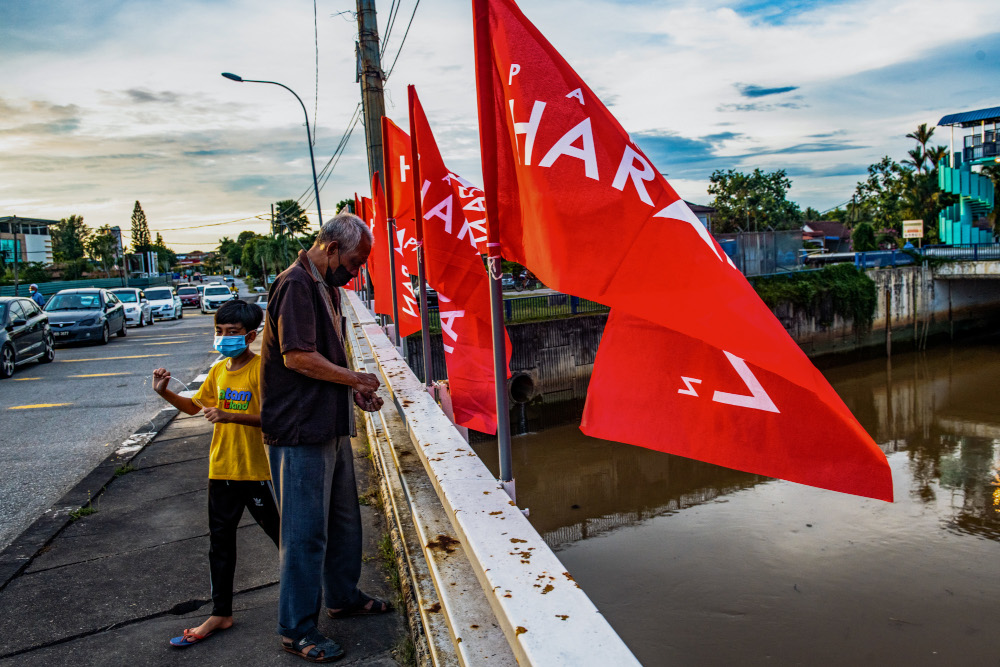MELAKA, Nov 9 — Political parties and candidates alike in the Melaka state election have found themselves grappling with the challenges of interacting with voters and canvassing amid stringent Covid-related standard operating procedures (SOP) that appear to have torn up the playbook on established campaign conventions.
Gone are the customary walkabouts, house-to-house visits, and heated but oftentimes comedic ceramah for candidates or party personalities to woo, impress or generally present a concise narrative to boost their image or trash talk their political opponents.
In the past, the usual fanfare surrounding elections saw ceramah or social gatherings conducted right up to midnight as candidates and campaigners utilised every available space to put their message on repeat.
Other daily affairs such as weddings, visits to the elderly or vulnerable communities, and paying respects to the recently deceased were also seen as opportunities for candidates to show how much they cared about their chosen constituency.
The muted activities seen so far in Melaka are largely due to the Election Commission’s (EC) detailed list of dos and don'ts that were released yesterday and are in effect for the entire duration of the official campaign period from November 8 to 19.
The rules, which abided by the government’s blanket ban on political gatherings or social events linked to the polls, also stipulated that only three campaigners in a single team are allowed to go from house-to-house distributing pamphlets or other published campaigning materials, but with strictly no face-to-face engagements.
The prohibition infuriated many party workers and volunteers, especially out-of-towners who travelled to Melaka for the express purpose of canvassing, said an Umno volunteer from Perak who wished to be known as Solohin.
“We have teams who came down here from all over the country with the sole purpose of engaging with voters and talking up our party and candidates,” he said.

“It is unusual that we are now only delegated to passing out flyers and putting up banners or buntings, which is not that effective without actually talking to voters.
“There is still talk that party leaders are discussing with the local authorities to push back on these SOP, and even rumours of an updated one. So, in the meantime, we have no choice but to wait for better clarity on the matter. Bottomline is that no one wants to get fined, or worse, get the party into trouble.”
Further restrictions include each political party being allowed only one district operational room, while smaller operational rooms or district polling centres, widely known as PDM (Pusat Daerah Mengundi), are not allowed to function at all.
Parties, such as Umno, PAS and Bersatu, often rely on PDMs and the personnel in charge to cajole fence-sitters, persuade voters to come out and cast their ballot, and to provide raw data on the estimated number of voters inclined to support their respective parties or otherwise.
While many PDMs have been set up by various political parties in all of the 28 seats up for grabs in Melaka, the restrictions have created a lot of uncertainty, especially at the micro-level, said Solihin.
“There is still a lot of back and forth from these centres to state leaders on whether they should continue to operate or not.
“What they worry about most is losing momentum to gauge voters, but there are a lot more questions than answers right now and everyone is asking what they can and cannot do. It's frustrating,” he said.

Across Melaka, flags, banners and political slogans, which usually blanket roadsides, junctions, and other public spaces that see huge foot or vehicle traffic, are relatively sparse, even though activities related to putting up these materials are not prohibited by the EC.
In its detailed list, the EC urged candidates to maximise the use of online platforms and instant messaging applications to get their narratives across instead.
The EC also allowed the use of vehicles equipped with public address (PA) systems to play recorded messages or disseminate political messages on loudspeakers; however, they are not allowed to stop and park during said activities.
Candidates are also prohibited from using stationary vehicles, such as trucks or vans equipped with PA systems to deliver their ceramah.
The EC also said candidates must apply for a police permit to use such vehicles during their campaign.
A campaign worker attached with DAP and its election machinery in the state seat of Ayer Keroh, who prefers to remain anonymous, said such vehicles were employed on their first day of campaigning.
However, the worker stated that the police permit only allows campaigning activities up to 6pm.

When asked whether the candidates are allowed to be in the van to deliver speeches, the worker simply said that the question remains unanswered as they are still waiting for further clarifications on the SOP from the local authorities.
This sense of uncertainty over the SOP has overshadowed the campaigns of all political parties, said another PKR volunteer with the campaigning effort in the Tanjung Bidara seat who also did not want to be named.
“Honestly, we all would like to get started and campaign for our party and candidate. People need to know what we can bring to the table. But at the moment, everyone is asking what is the SOP instead of doing this.
“So we have to wait and see. For the time being, we do what we can based on the SOP,” he said
Prior to the EC’s rules, the Health Ministry announced a ban on all political gatherings and social events linked to the Melaka state election from October 25 to November 27.
Melaka will head to the ballot box on November 20, with 28 state seats to be contested following the collapse of the previous government.



















